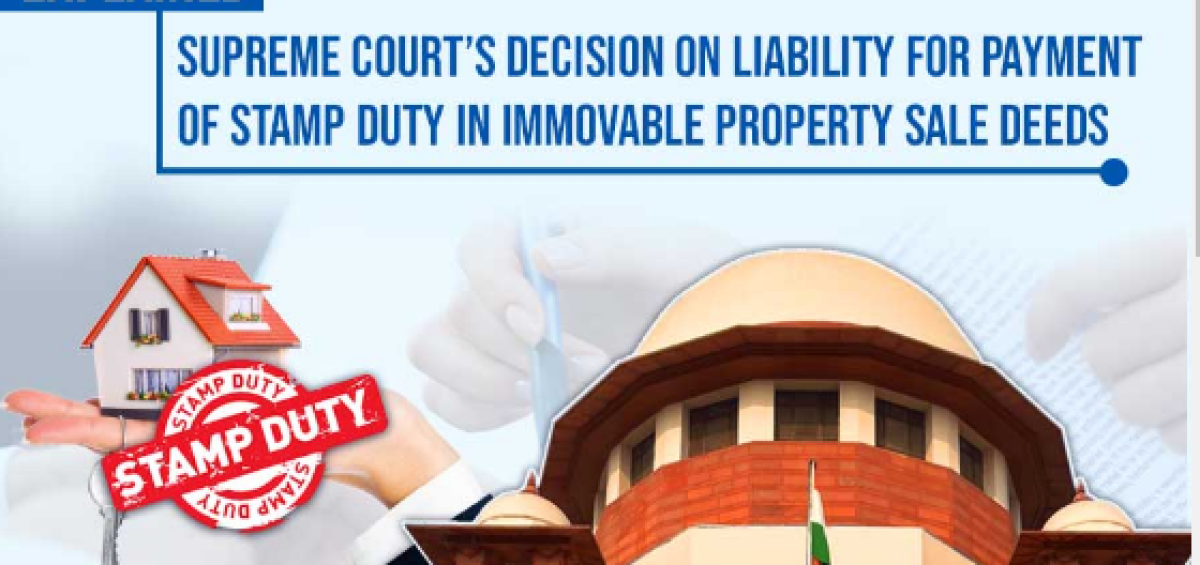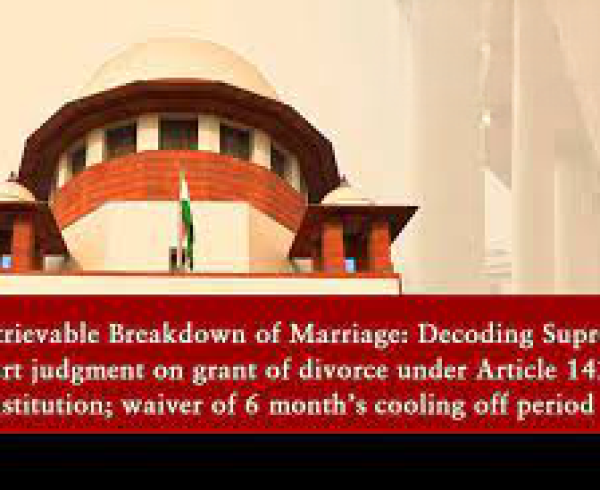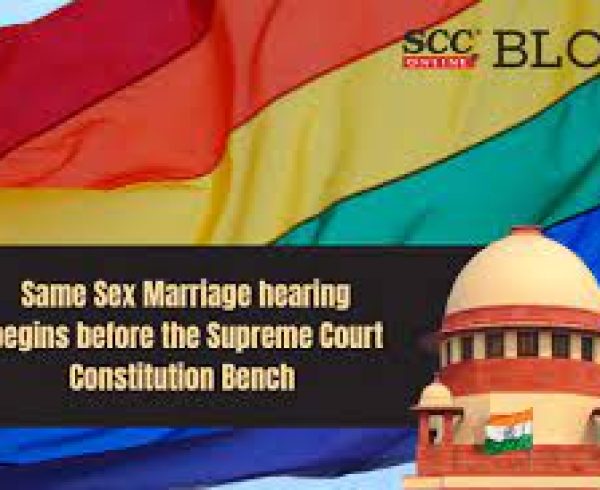The Supreme Court ruled that the value of the plant and machinery must be considered and ascertained for payment of stamp duty on sale deeds
Supreme Court: In a civil appeal challenging the Judgment of the Division Bench of the Andhra Pradesh High Court, wherein the Division Bench of K.M. Joseph* and Hrishikesh Roy JJ., allowed the appellant’s appeal and set aside the impugned Judgment. The Court clarified the liability for payment of stamp duty on sale deeds of immovable property including plants and machinery.
Background
The High Court of Andhra Pradesh (‘High Court’) vide Order dated 13-06-2002, ordered Midwest Iron and steel Company Ltd. (‘Midwest Iron’) to be wound up. In an auction to sell the property of Midwest Iron, the SMC Marketing Private Ltd. (‘Respondent 2’) was the highest bidder for the amount of Rs. 8.35 Crores and became the successful auction purchaser. It bid for the property which consisted of land, building, civil works, plant & machinery and current assets, etc. A direction was given by Company Court in 2004, at the instance of the Respondent 2, permitting the Official Liquidator to execute the sale deed in favour of the Dankuni Steel Ltd. (‘Respondent 1/nominee’). Thereafter, a sale deed was executed by the Official Liquidator on 05-08-2004.
The Respondents 1 and 2 applied for registration of the sale deed on the basis that the land and building had to be registered with the value thereof being shown as Rs. 1,01,05,000/-. The Sub-Registrar (‘first appellant’) vide communication dated 12-08-2004 informed the Respondent 1 that the registration was kept pending for the following reasons:
- The chargeable value as per the contents of the documents was assessed to be Rs. 8.35 crores whereas Respondents 1 and 2 had stated that only the land and buildings were being transferred for Rs. 1,01,05,000/-.
- Since 50% exemption was being claimed, the G.O. had to be verified thoroughly.
- The land in some of the Surveys were found to be Government land.
The District Registrar, Srikakulam (‘second appellant’) directed the Respondent 1 and the Official Liquidator to deposit Rs. 8629025/- as stamp duty besides penalty of Rs. 1000/-. Thus, aggrieved by the said communication the Respondents 1 and 2 filed a Writ Petition, heard by a Single Judge.
An Order was passed by Single Judge allowing the Respondent 2 to carry out repair and overhaul operations, subject to certain conditions. It was also found that Respondents 1 and 2 were using the plant and machinery for their business and had no intention to remove and sell them as scrap or otherwise. Therefore, it was held that since the property covered by the sale deed covered not only the land, buildings and civil works, but plant and machinery also, the value of the plant and machinery also had to be considered for payment of stamp duty. Further, it was found that since the Respondent 1 was an industry and wanted to run the unit as an industry, the benefit of GOMS 103 Revenue (Registration) Department dated 07-02-2001 could be extended to it.
Therefore, the petition filed by the respondents was allowed in part and the matter was remitted to the second appellant to determine the current assets and to deduct their value from Rs. 8.35 crores and to reckon the remaining value as the value of the land, buildings, civil works, plant and machinery and collect stamp duty, penalty, if any, by extending the benefit of GOMS 103 dated 07-02-2001 to the respondents.
Thereafter, two Writ Appeals were preferred before the Division Bench by the respondents and appellants against the Single Judge’s Judgment. The Division Bench held that the respondents cannot be compelled to register and pay the stamp duty on the plant and machinery, when they only sought registration for the land, thus the Division Bench’s decision was appealled before the Court forming the impugned Judgment.
Supreme Court’s Decision
The Court noted the definition of the word ‘immovable property’ in the Registration Act, 1908, General Clauses Act, 1897 and the Transfer of Property Act, 1882 (‘the TPA’). The Court also perused the Section 8 of the TPA and said that it declares that in the absence of an express or implied indication, a transfer of property passes to the transferee all the interests, which the transferor was capable of passing in the property and in the legal incidents thereof. Such incidents includes, inter alia, where the property is land, all things attached to the earth. When the property is machinery attached to the earth, the movable parts thereof also are comprehended in the transfer. The Court referred to Himalaya House Co. Ltd. v. Chief Controlling Revenue Authority, (1972) 1 SCC 726, wherein it was observed that no provision in the Stamp Act empowers the Revenue to make an independent inquiry of the value of the property conveyed for determining the duty chargeable.
The Court said that the Respondent 2 was, undoubtedly, the auction purchaser. The auction sale was related to the assets of the company, which included the land, the building, the plant and machinery and other assets. The vendee, under the sale deed was Respondent 2, being the nominee of Respondent 2. The Court that the vendee had paid full consideration. The total sale consideration, as it was clear from the sale deed itself, was Rs. 8.35 crores, for the land, building, civil works, plant and machinery and current assets, etc, however, what had been done is that an amount of Rs. 10105000/- was taken as the value of the land, building and civil works based on the offer received by the Liquidator, when the assets were put up for sale individually.
The Court referred to the conduct of both the respondents and said that it conveyed the impression that they wanted to repair and maintain the plant and machinery. Furthermore, they also sought the benefit of the exemption provided under GoMS 103 dated 07-02-2001, which Government Order purported to provide for certain concessions in the form of exemption from stamp duty and registration fee in favour of industrial units. The Court agreed with the view of the Single Judge that the unit was purported to be operated as a going concern and apparently the Respondent 1 did not intend to dispose of the plant and machinery as scrap. Therefore, the Court considered it appropriate to examine the exigibility of the plant and machinery to stamp duty under the Indian Stamp Act, 1899 (‘the Act’).
The Court referred to the Recital of the Sale Deed in conjunction with Section 8 of the TPA, and said that the intention of the parties was self-evident that the vendor intended to convey all things, which inter alia stood attached to the earth. The mere fact that there was no express reference to plant and machinery in the Recital Clause cannot mean that the interest in the plant and machinery which stood attached to the land, which was scheduled, was not conveyed to the Respondent 1. The sum of Rs. 8.35 crores was indicated as the total sale consideration for the asset sold to the Respondent 1, comprising of land, building, civil works, plant and machinery and current assets, etc. The Respondent 1 had taken out the value of the land, building and civil works, and shown it at Rs. 10105000/-, and then indicating only the said amount as value. The Court said that this was apparently to tide over the liability to pay stamp duty for what was actually, in law, conveyed to the Respondent 1. Further, the Court said that as Respondents 1 and 2 had given up their claim for exemption based on the Government Order, the Division Bench accepted the same. The Division Bench overlooked the nature of the transaction, the effect of the auction sale, the property sold and their value, and the fact that the Company Judge had by order dated 15-06-2004 left it open to the authority to determine the liability. The Division Bench did not consider the preambular part. It also failed to bear in mind the power available with the authorities.
The Court said that the efforts of Respondents 1 and 2 were to avoid payment of the stamp duty as due in law. The Court also said that the Division Bench had erred in not noticing the true purport of the Sale Deed in conjunction with Section 8 of the TPA and the definition of the word ‘immovable property’. The Court further viewed in context of Duncans Industries Ltd. v. State of U.P., (2000) 1 SCC 633, Member, Board of Revenue v. Arthur Paul Benthall, (1955) 2 SCR 842, other attendant facts, including the contents of the Preambular portion and the conduct of the Respondents 1 and 2, that Sale Deed operated to convey the rights over the plant and machinery as well, which was comprised in the land scheduled in the sale deed. As far as the plant and machinery was concerned, the Court said that it must, however, be only such plant and machinery, which was permanently embedded to the earth and answering the description of the immovable property as defined. The Court also noted that such an inquiry was not done to ascertain the same by the appellants.
Further the Court noted that the proviso to Section 27 of the Act empowers the Officer to inspect the property, make local inquiries in the facts, call for connected records, examine them and satisfy that the provisions of Section 27 are complied with.
The Court noted that, at the request of the Respondent 2, the Company Court ordered that the sale deed be executed in favour of its nominee. Therefore, the Respondent 1, accordingly, became the vendee under the Sale Deed. Thus, the Court said that Respondent 1, was liable in law as vendee to pay the stamp duty.
Therefore, the Court set aside the impugned Judgment and restored the Judgment of the Single Judge subject to the modification that the direction to the second appellant to give benefit of GOMS 103 dated 07-02-2001. Therefore, the Court upheld the view of the Single Judge that the value of the plant and machinery must be considered for payment of the stamp duty. The Court also made it clear that the second respondent cannot be made liable under the Judgment. The Second appellant was directed to determine the value of the plant and machinery as per the description of the immovable property and examine whether the Respondent 1 was entitled to be qualified for the benefit of exemption of the stamp duty.
[Sub Registrar v. Dankuni Steels Ltd., 2023 SCC OnLine SC 499, Decided on 26-04-2023].






Leave a Comment